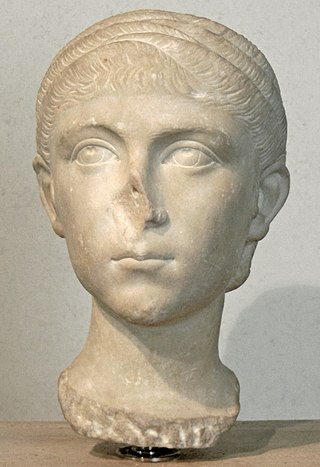Related Research Articles

Lucius Septimius Severus was Roman emperor from 193 to 211. He was born in Leptis Magna in the Roman province of Africa. As a young man he advanced through the customary succession of offices under the reigns of Marcus Aurelius and Commodus. Severus was the final contender to seize power after the death of the emperor Pertinax in 193 during the Year of the Five Emperors.

The Severan dynasty, sometimes called the Septimian dynasty, was an Ancient Roman imperial dynasty that ruled the Roman Empire between 193 and 235, during the Roman imperial period. The dynasty was founded by the emperor Septimius Severus, who rose to power after the Year of the Five Emperors as the victor of the civil war of 193–197, and his wife, Julia Domna. After the short reigns and assassinations of their two sons, Caracalla and Geta, who succeeded their father in the government of the empire, Julia Domna's relatives themselves assumed power by raising Elagabalus and then Severus Alexander to the imperial office.
The 200s decade ran from January 1, 200, to December 31, 209.
The 180s decade ran from January 1, 180, to December 31, 189.
The 190s decade ran from January 1, 190, to December 31, 199.
Year 217 (CCXVII) was a common year starting on Wednesday of the Julian calendar. At the time, it was known as the Year of the Consulship of Praesens and Extricatus. The denomination 217 for this year has been used since the early medieval period, when the Anno Domini calendar era became the prevalent method in Europe for naming years.
The 210s decade ran from January 1, 210, to December 31, 219.

Year 200 (CC) was a leap year starting on Tuesday of the Julian calendar. At the time, it was known as the Year of the Consulship of Severus and Victorinus. The denomination 200 for this year has been used since the early medieval period, when the Anno Domini calendar era became the prevalent method in Europe for naming years.
Year 202 (CCII) was a common year starting on Friday of the Julian calendar. At the time, it was known as the Year of the Consulship of Severus and Antoninus. The denomination 202 for this year has been used since the early medieval period, when the Anno Domini calendar era became the prevalent method in Europe for naming years.
Year 197 (CXCVII) was a common year starting on Saturday of the Julian calendar. At the time, it was known as the Year of the Consulship of Magius and Rufinus. The denomination 197 for this year has been used since the early medieval period, when the Anno Domini calendar era became the prevalent method in Europe for naming years.
Year 205 (CCV) was a common year starting on Tuesday of the Julian calendar. At the time, it was known as the Year of the Consulship of Aurelius and Geta. The denomination 205 for this year has been used since the early medieval period, when the Anno Domini calendar era became the prevalent method in Europe for naming years.

Year 208 (CCVIII) was a leap year starting on Friday of the Julian calendar. At the time, it was known as the Year of the Consulship of Aurelius and Geta. The denomination 208 for this year has been used since the early medieval period, when the Anno Domini calendar era became the prevalent method in Europe for naming years.

Year 211 (CCXI) was a common year starting on Tuesday of the Julian calendar. At the time, in the Roman Empire it was known as the Year of the Consulship of Terentius and Bassus. The denomination 211 for this year has been used since the early medieval period, when the Anno Domini calendar era became the prevalent method in Europe for naming years.
Year 212 (CCXII) was a leap year starting on Wednesday of the Julian calendar. At the time, it was known as the Year of the Consulship of Asper and Camilius. The denomination 212 for this year has been used since the early medieval period, when the Anno Domini calendar era became the prevalent method in Europe for naming years.
Sextus Varius Marcellus was a Roman aristocrat and politician from the province of Syria. He was father of the emperor Elagabalus.

Gaius or Lucius Fulvius Plautianus was a member of the Roman gens Fulvia. As head of the Praetorian Guard, he was very influential in the administration of state affairs, and clashed with Julia Domna, the wife of Septimius Severus.

Publia Fulvia Plautilla was the wife of the Roman emperor Caracalla, her paternal second cousin. After her father was condemned for treason, she was exiled and eventually killed, possibly on Caracalla's orders.
Gaius Julius Avitus Alexianus was a Roman nobleman of Syria who had an impressive military and political career.
Publius Septimius Geta was the second son to the elder Publius Septimius Geta and brother of the emperor Septimius Severus. His mother was Fulvia Pia. He was born and raised in Leptis Magna. He had Italian Roman ancestry on his mother's side, and was descended from Punic forebears on his father's side.
The gens Septimia was a minor plebeian family at ancient Rome. The gens first appears in history towards the close of the Republic, and they did not achieve much importance until the latter half of the second century, when Lucius Septimius Severus obtained the imperial dignity.
References
- ↑ Birley, Anthony R. (1999). Septimius Severus: The African Emperor, p. 153. London: Routledge. ISBN 978-0-415-16591-4.